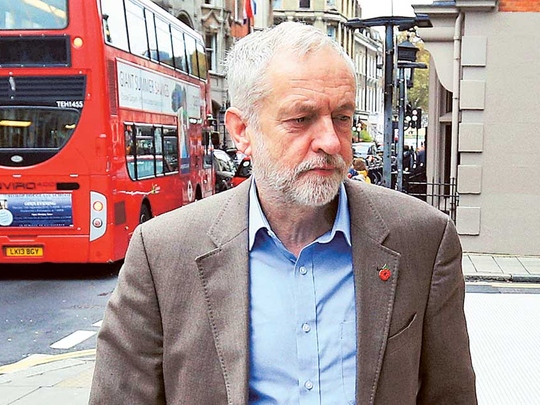
London: Parliament must accept that Britain’s vote to leave the European Union was legitimate and let the government get on with delivering Brexit ‘in full’, Prime Minister Theresa May said on Sunday.
May has said she is confident of overturning a British court ruling that the government needs parliamentary approval to start the process of leaving the EU.
The ruling has provoked anger among ardent Eurosceptics who fear lawmakers who supported staying in the bloc will try to water down the terms of Britain’s exit.
But, writing in the Sunday Telegraph newspaper, May signalled she would resist any such attempts.
“The people made their choice, and did so decisively. It is the responsibility of the government to get on with the job and to carry out their instruction in full,” May wrote.
The head of Britain’s opposition Labour Party said on Sunday that he would try to block divorce talks with the EU if the government does not agree to his Brexit demands.
The government, which has given little away about its plans for Britain’s future relationship with the EU, has said that having to set out a detailed negotiating strategy to parliament would put it at a disadvantage in talks with the bloc.
“It was MPs (members of parliament) who overwhelmingly decided to put the decision in their (voters’) hands. The result was clear. It was legitimate,” May said in a separate statement ahead of her first trade trip to India on Sunday.
“MPs and peers who regret the referendum result need to accept what the people decided.” May will use her first bilateral trade trip since taking office to try to boost ties with India before Britain leaves the EU and to pave the way for a free trade deal as soon as possible once Brexit is completed.
Parliament could in theory block Brexit as most members supported staying in the EU in June’s referendum, although it is unlikely to do so.
The ruling could allow lawmakers to temper the government’s approach, however, making a “hard Brexit” — where tight controls on immigration are prioritised over remaining in the European single market — less likely.
A government appeal against the High Court ruling is expected to be considered by Britain’s Supreme Court early next month. May has said she still plans to launch talks on the terms of Brexit by the end of March.
“We need to turn our minds to how we get the best outcome for our country,” she said in the statement issued by her office.
“That means sticking to our plan and timetable, getting on with the work of developing our negotiating strategy and not putting all our cards on the table — that is not in our national interest and it won’t help us get the best deal for Britain.”
On her visit to India, May’s office said the visit starting on Sunday night would focus on breaking down barriers to trade and investment and paving the way for a free trade deal as soon as possible after Brexit, which is not expected to happen before 2019.
Explaining the choice of India, a government official said: “It matters now more than ever. India is the fastest-growing major economy.” May said the trip was about seizing the opportunities of Brexit and “expanding our horizons and forging stronger partnerships with countries around the world”.
“This is a partnership about our shared security and shared prosperity. It is a partnership of potential. And on this visit I intend to harness that potential, rebooting an age-old relationship,” she said in a statement ahead of the visit.
While Britain cannot sign trade deals with third countries until it is outside the EU, the government is keen to hold preparatory discussions.
May, accompanied by trade ministers Liam Fox and Greg Hands and around 40 business representatives mainly from small- and medium-sized technology and health care firms, will address a technology summit, have a working lunch with Indian Prime Minister Narendra Modi and meet businesses.
May and Modi will also launch a partnership on smart cities and urban development which could generate business worth up to £2 billion (Dh8.4 billion) for British firms over the next five years, her office said.
Britain will press India to allow its law firms to operate there, and will also offer its government expertise in areas such as deregulation and tax to help make India a more attractive business environment.
The official declined to say whether May would specifically raise with Modi the issue of Tata Steel Ltd, which put its British steel operations up for sale earlier this year but suspended it in July due to uncertainty over the Brexit vote.












